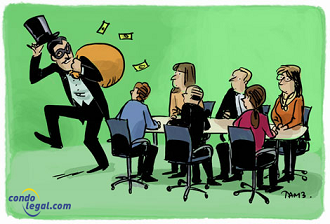 August 13, 2023 - Contingency funds should not be confused with working capital. However, many condominiums dip into their contingency fund in all sauces, which will eventually turn against them.
August 13, 2023 - Contingency funds should not be confused with working capital. However, many condominiums dip into their contingency fund in all sauces, which will eventually turn against them.
Those who have developed this bad habit, by promising to remit the sums of money deducted with interest at a later date, are transgressing the rules set out in article 1071 of the Civil Code of Québec. This windfall represents the financial heritage of a condominium. It can only be used to pay for major repairs to be made in a building, or to replace common areas that have expired.
A lifeline
Often caught off guard financially, many condominium administrators use the money allocated to the contingency fund for other purposes, such as a deficit operating fund. This is revealed by Aline Désormeaux, Chartered Professional Accountant (CPA) and member of the Board of Directors of the Regroupement des gestionnaires et copropriétaires du Québec (RGCQ). The latter has developed expertise in accounting for condominiums. Extracting money from this fund has become the norm, for example when a syndicate has to deal with co-owners who are bad payers. By not paying their condo fees, they put a condominium at risk financially.
This easily accessible money can also be used for other reasons: "We have seen syndicates of co-owners finance the construction of a swimming pool with their contingency fund," says Yves Joli-Coeur, lawyer emeritus and president of the RGCQ. In other cases, this available nest egg can be used for window washing, or to replace lawn tractors.
Litigation in sight
The use of the contingency fund indiscriminately will eventually be damaging, as it could generate lawsuits. For example, imagine that after changing officers several times, a new board of directors has to deal with major repairs to its building. Once the calculations had been made as to how much they would cost, the Directors noted that the contingency fund was insufficient to finance them because they had not contributed the contribution amounts established by the contingency fund study, or because they had not injected sufficient liquidity.
Such a scenario could turn into a nightmare for these directors, who could be prosecuted for dereliction of duty, but also for embezzlement. All in all, dipping into the contingency fund for the wrong reasons will be very unproductive in the medium and long term. It is better to be notified to avoid trouble.
Montreal August 13, 2023
